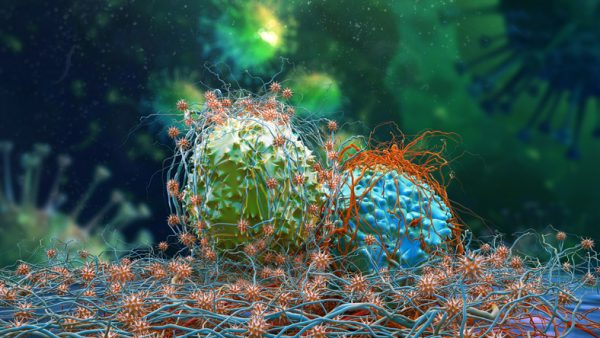
Competition is heating up among CAR-T cell and other investigational therapies for the second most-common form of blood cancer, as multiple companies have released data from clinical trials of their respective programs over the past few days.
On Friday, New York-based Bristol-Myers Squibb and Cambridge, Massachusetts-based bluebird bio announced positive top-line data from their Phase II KarMMa study of idecabtagene vicleucel – also known as ide-cel, or bb2121 – in relapsed and refractory multiple myeloma. And on Saturday, Johnson & Johnson announced initial data from its Phase Ib/II CARTITUDE-1 study of JNJ-68284528.
Both are CAR-T cell therapies that target the B-cell maturation antigen, or BCMA, a protein commonly expressed on multiple myeloma cells, in patients who have received multiple prior therapies. Multiple myeloma is a slow-growing but incurable cancer of the plasma cells.
J&J presented its data at the American Society of Hematology’s annual meeting in Orlando, Florida. Its CAR-T, also known as JNJ-4528 or LCAR-B38M, was originally developed by Nanjing, China-based Legend Biotech and subsequently in-licensed by J&J. The release of the KarMMa data coincided with ASH, but they were not presented at the conference. BMS is developing ide-cel under partnership with bluebird following its acquisition of bluebird’s original partner, Celgene.
Shares of bluebird were down around 5% Monday afternoon, while shares of BMS were up 2%. Shares of J&J were mostly flat.
According to the KarMMa data, of 140 patients enrolled, 128 were treated at the target dose levels of 150 million-450 million cells. Patients had received at least three prior therapies belonging to the three major classes of multiple myeloma treatment, including an immunomodulatory drug, a proteasome inhibitor and a monoclonal antibody targeting the antigen CD38. Among the patients, the median progression-free survival – a key outcome measure in multiple myeloma that indicates how long a patient lives without their disease progression – was 8.6 months, and 11.3 months at the 450 million-cell dose. The overall response rate was 73.4%, including 31.3% of patients who saw their tumors disappear entirely, known as the complete response rate. Patients remained in response to therapy for a median of 10.6 months.
Severe or worse cytokine release syndrome – a common side effect from CAR-T therapies that results from their rapid killing of cancer cells – occurred in 5.5% of patients, while severe or worse neurological toxicity occurred in 3.1%. One patient died from CRS.
BMS said it is actively preparing to submit the KarMMa data to regulators. In a note to investors, Cowen analyst Yaron Werber wrote that assuming a filing in the first half of 2020, ide-cel would be on track for approval by the end of next year.
Although its data are far less mature, J&J’s presentation showed that among 29 patients who had received a median of five prior multiple myeloma therapies, 100% achieved a response, including 69% who achieved at least a complete response. One patient experienced severe CRS, and one died from CRS.
Werber wrote that with ide-cel likely to be the first multiple myeloma CAR-T to hit the market, future drugs will have to show better efficacy in order to take away its market share. “With a 1.5-year lead and setting a high bar, bb2121 has a potential to be first to market, which is a considerable advantage,” he wrote.
But according to another analyst, that’s hardly set in stone. Canaccord Genuity analyst John Newman wrote that bluebird could find its shares under pressure in the near term, given that J&J and another BMS therapy, CC-93269, a BCMA-targeting T-cell engager, also showed strong data.
Phase I data on CC-93269 showed an 89% overall response rate, including a 33% complete response rate, noted Baird analyst Brian Skorney. Meanwhile, Regeneron presented at ASH its first clinical data on REGN5458, a BCMA-targeting bispecific monoclonal antibody. Among seven patients, the response rate was 57%, including a 75% response rate among the four who received the higher dose of 6mg weekly.
“[The] promise of cellular therapy looks to be challenged, in our view, with intermittently dosed therapeutics designed to simultaneously target BCMA and activate T cells,” Skorney wrote, adding that BMS and Celgene may be the first to “cannibalize their own bb2121 opportunity” with CC-93269.
Still, clinical experience has indicated that the presence on the market of therapies with the same antigen target but with different mechanisms of action does not necessarily require choosing one over the other. At the American Society of Clinical Oncology meeting in June, Amgen presented data on the drug AMG 420, which as a BCMA-targeting bispecific antibody could be in a potential competitive position against BCMA-targeting CAR-Ts, thanks to its off-the-shelf availability, compared with the cumbersome manufacturing process associated with the cell therapies.
One myeloma expert nevertheless said at the ASCO meeting that the hope is for drugs like AMG 420 to complement rather than supplant CAR-T therapies. A key consideration is whether patients who relapse after AMG 420 – or, for that matter, CC-93269 – continue to express BCMA, thereby making their disease still susceptible to a BCMA-targeting CAR-T. In the case of another Amgen bispecific antibody, the CD19-targeting Blincyto (blinatumomab), the rate of patients relapsing without the antigen is quite low, ranging from 6-15%, and numerous patients who have received CD19-directed CAR-Ts have previously been treated with Blincyto. However, data on antigen-negative relapses were not available for AMG 420 at the time of ASH.
Photo: nopparit, Getty Images














